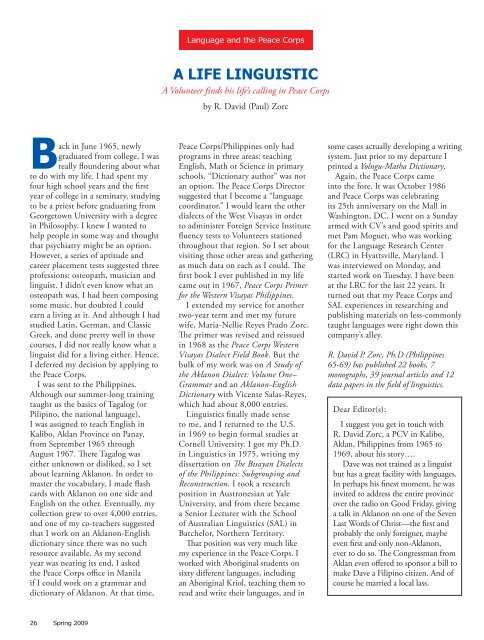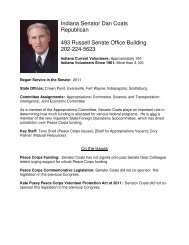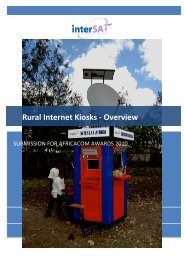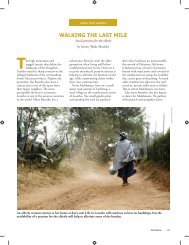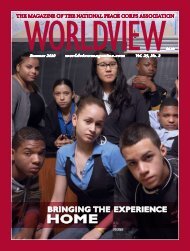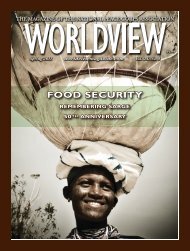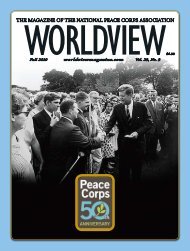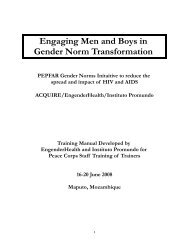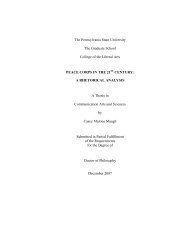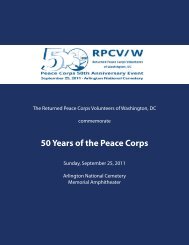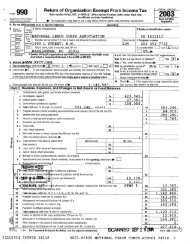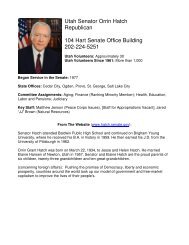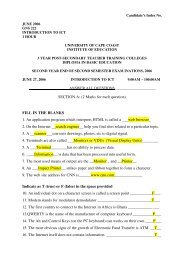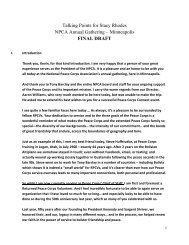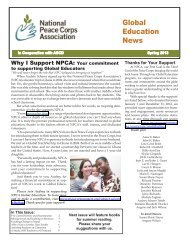special issue: inauguration 2009 - National Peace Corps Association
special issue: inauguration 2009 - National Peace Corps Association
special issue: inauguration 2009 - National Peace Corps Association
You also want an ePaper? Increase the reach of your titles
YUMPU automatically turns print PDFs into web optimized ePapers that Google loves.
Language and the <strong>Peace</strong> <strong>Corps</strong><br />
A LIFE LINGUISTIC<br />
A Volunteer finds his life’s calling in <strong>Peace</strong> <strong>Corps</strong><br />
by R. David (Paul) Zorc<br />
B<br />
ack in June 1965, newly<br />
graduated from college, I was<br />
really floundering about what<br />
to do with my life. I had spent my<br />
four high school years and the first<br />
year of college in a seminary, studying<br />
to be a priest before graduating from<br />
Georgetown University with a degree<br />
in Philosophy. I knew I wanted to<br />
help people in some way and thought<br />
that psychiatry might be an option.<br />
However, a series of aptitude and<br />
career placement tests suggested three<br />
professions: osteopath, musician and<br />
linguist. I didn’t even know what an<br />
osteopath was. I had been composing<br />
some music, but doubted I could<br />
earn a living at it. And although I had<br />
studied Latin, German, and Classic<br />
Greek, and done pretty well in those<br />
courses, I did not really know what a<br />
linguist did for a living either. Hence,<br />
I deferred my decision by applying to<br />
the <strong>Peace</strong> <strong>Corps</strong>.<br />
I was sent to the Philippines.<br />
Although our summer-long training<br />
taught us the basics of Tagalog (or<br />
Pilipino, the national language),<br />
I was assigned to teach English in<br />
Kalibo, Aklan Province on Panay,<br />
from September 1965 through<br />
August 1967. There Tagalog was<br />
either unknown or disliked, so I set<br />
about learning Aklanon. In order to<br />
master the vocabulary, I made flash<br />
cards with Aklanon on one side and<br />
English on the other. Eventually, my<br />
collection grew to over 4,000 entries,<br />
and one of my co-teachers suggested<br />
that I work on an Aklanon-English<br />
dictionary since there was no such<br />
resource available. As my second<br />
year was nearing its end, I asked<br />
the <strong>Peace</strong> <strong>Corps</strong> office in Manila<br />
if I could work on a grammar and<br />
dictionary of Aklanon. At that time,<br />
<strong>Peace</strong> <strong>Corps</strong>/Philippines only had<br />
programs in three areas: teaching<br />
English, Math or Science in primary<br />
schools. “Dictionary author” was not<br />
an option. The <strong>Peace</strong> <strong>Corps</strong> Director<br />
suggested that I become a “language<br />
coordinator.” I would learn the other<br />
dialects of the West Visayas in order<br />
to administer Foreign Service Institute<br />
fluency tests to Volunteers stationed<br />
throughout that region. So I set about<br />
visiting those other areas and gathering<br />
as much data on each as I could. The<br />
first book I ever published in my life<br />
came out in 1967, <strong>Peace</strong> <strong>Corps</strong> Primer<br />
for the Western Visayas Philippines.<br />
I extended my service for another<br />
two-year term and met my future<br />
wife, Maria-Nellie Reyes Prado Zorc.<br />
The primer was revised and re<strong>issue</strong>d<br />
in 1968 as the <strong>Peace</strong> <strong>Corps</strong> Western<br />
Visayas Dialect Field Book. But the<br />
bulk of my work was on A Study of<br />
the Aklanon Dialect: Volume One–<br />
Grammar and an Aklanon-English<br />
Dictionary with Vicente Salas-Reyes,<br />
which had about 8,000 entries.<br />
Linguistics finally made sense<br />
to me, and I returned to the U.S.<br />
in 1969 to begin formal studies at<br />
Cornell University. I got my Ph.D.<br />
in Linguistics in 1975, writing my<br />
dissertation on The Bisayan Dialects<br />
of the Philippines: Subgrouping and<br />
Reconstruction. I took a research<br />
position in Austronesian at Yale<br />
University, and from there became<br />
a Senior Lecturer with the School<br />
of Australian Linguistics (SAL) in<br />
Batchelor, Northern Territory.<br />
That position was very much like<br />
my experience in the <strong>Peace</strong> <strong>Corps</strong>. I<br />
worked with Aboriginal students on<br />
sixty different languages, including<br />
an Aboriginal Kriol, teaching them to<br />
read and write their languages, and in<br />
some cases actually developing a writing<br />
system. Just prior to my departure I<br />
printed a Yolngu-Matha Dictionary.<br />
Again, the <strong>Peace</strong> <strong>Corps</strong> came<br />
into the fore. It was October 1986<br />
and <strong>Peace</strong> <strong>Corps</strong> was celebrating<br />
its 25th anniversary on the Mall in<br />
Washington, DC. I went on a Sunday<br />
armed with CV’s and good spirits and<br />
met Pam Moguet, who was working<br />
for the Language Research Center<br />
(LRC) in Hyattsville, Maryland. I<br />
was interviewed on Monday, and<br />
started work on Tuesday. I have been<br />
at the LRC for the last 22 years. It<br />
turned out that my <strong>Peace</strong> <strong>Corps</strong> and<br />
SAL experiences in researching and<br />
publishing materials on less-commonly<br />
taught languages were right down this<br />
company’s alley.<br />
R. David P. Zorc, Ph.D (Philippines<br />
65-69) has published 22 books, 7<br />
monographs, 39 journal articles and 12<br />
data papers in the field of linguistics.<br />
Dear Editor(s):<br />
I suggest you get in touch with<br />
R. David Zorc, a PCV in Kalibo,<br />
Aklan, Philippines from 1965 to<br />
1969, about his story….<br />
Dave was not trained as a linguist<br />
but has a great facility with languages.<br />
In perhaps his finest moment, he was<br />
invited to address the entire province<br />
over the radio on Good Friday, giving<br />
a talk in Aklanon on one of the Seven<br />
Last Words of Christ—the first and<br />
probably the only foreigner, maybe<br />
even first and only non-Aklanon,<br />
ever to do so. The Congressman from<br />
Aklan even offered to sponsor a bill to<br />
make Dave a Filipino citizen. And of<br />
course he married a local lass.<br />
26 Spring <strong>2009</strong>


